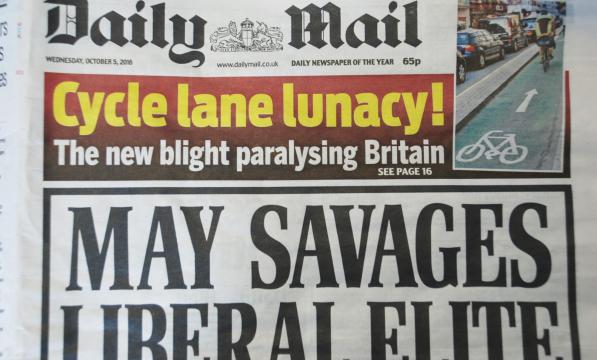Daily Mail fail: it's lunacy we have so few cycle lanes

Tom Rawstorne’s article is a funny piece. Entitled ‘Cycle Lanes Luncacy’, it stands out as an attack on the very idea of building cycle tracks. However, it is funny to see the author’s biggest gripe – “more and more [cycle lanes] are being built across Britain, causing gridlock and pollution. And the maddest thing of all? They’re often EMPTY”, raged the subheading.
Can we safely assume then, that the author’s despair may be satiated by seeing more people cycling, for any purpose, at any time of day? After all he does seem to agree that reducing pollution is a “noble aim”. If so, I dare say I agree with the Daily Mail!
Unfortunately for Rawstorne, the solution may also be the problem. Lessons from the Netherlands are that for cycling to become a mainstream way of getting around for any journey, a full network of cycle-friendly infrastructure must be built. After all, what use is a segregated track along the Victoria Embankment if you’ve got to negotiate the Aldgate one-way system to reach it?
More to the point, Rawstorne criticises this scheme, known as the East-West Cycle Superhighway, as “virtually empty outside the rush-hour”. Leaving aside his slight exaggeration, is it any surprise that it's less busy outside the peak period? After all, that's true of the whole of the road network, and the rail, bus and underground networks too: are they also a waste of money? It's a central London route, and it's neither a shopping or a residential street - so of course it's dominated by commuter cycling! It already carries huge numbers of commuter cyclists, and that is precisely its aim (though it's also popular for recreational riding at weekends).
If the author would like to see cycle tracks in use at different hours of the day, perhaps he should take a visit to Cambridge or the Netherlands, where good quality provision exists in residential areas. However, Rawstorne would do well to learn that different routes are busy at different times – the City of London is blissfully quiet on a Sunday."
Paul Tuohy, Cycling UK Chief Executive
It is pleasing to see Rawstorne note that, despite a growing population, car traffic is falling in central London and that, since the cycle tracks were built, there has been a sixty percent increase in cyclists on those routes. I fail to see how this adds up to an argument against cycle tracks for someone expressing concerns about congestion and pollution.
It is good to see that Rawstorne notes the rise in private hire vehicles (largely down to Uber) and the number of vans (largely because of online shopping) as reasons for increased congestion. Perhaps if we had full networks of high quality cycle tracks – so people felt safe to cycle anywhere – we could reduce the level of demand for these services.
For decades, the default policy in this country has been to expand roads to make space for motor-traffic. And for decades, congestion and pollution have worsened.
To blame congestion problems on cycling is clearly a nonsense. Just do the maths; one lane of a typical road can carry 2,000 cars per hour, or 14,000 cycles. By enabling more people to cycle safely, cycle tracks make highly efficient use of scarce road-space."
Paul Tuohy, Cycling UK Chief Executive
It is time to rethink our transport policy. We need comprehensive networks of cycle infrastructure, built to a high standard. Only then will we all truly enjoy the benefits of cycling. Not just because it reduces congestion, improves health and local economies but – I’m sure to Rawstorne’s delight – because it improves driver satisfaction.
The Daily Mail has previously cited the Netherlands as the country with the highest driver satisfaction in the world – a country synonymous with cycle use and cycle tracks.
So, Tom Rawstorne, please back our call for Space for Cycling. We want to see the conditions where anyone can cycle anywhere, for any purpose at any time of day. We believe that everyone – not just people who choose to cycle – will enjoy the benefits.
If you would like to get involved with Space for Cycling, why not come along to one of our ten roadshow events taking place across the country?

